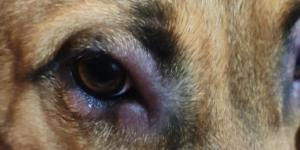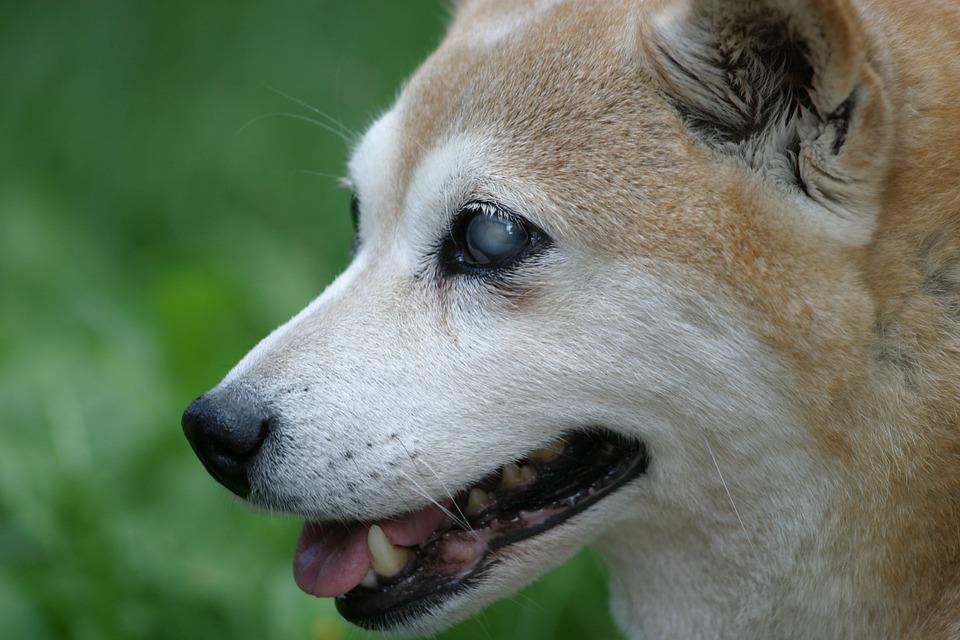How to Know if Your Dog is Blind



See files for Dogs
Have you ever wondered why dogs go blind? It is common to see blindness in elderly dogs, but it can be disheartening to see it happen. It is perhaps even sadder when it occurs with younger dogs or puppies. However, it is important to remember that the inability to see doesn't mean they can't have fulfilling and joyful lives. Their heightened sense of smell and other senses as compared to humans also means they can live well on a practical level.
In this AnimalWised article we discuss how to know if your dog is blind? We will talk about the different causes of blindness in dogs as well as the symptoms to detect it and the treatment to manage it. However, if you feel like your dog might be blind, don't neglect a visit to a specialist in veterinary ophthalmology to receive personalized and specific advice.
Uveitis - inflammation of the eye
There are many causes of blindness in dogs. Sometimes, it can be a relatively normal result of old age as a dog's physicality deteriorates. However, it can also be a symptom of a more serious secondary disease. Also, if dog's vision is compromised, it may be better to treat it before it gets worse. Blindness can also be a result of something you may not link to the eyes such as kidney failure as occurs in the onset of chronic kidney disease, resulting in a deficiency of metabolism. In these cases, blindness is all but inevitable.
As the causes of blindness in dogs are variable, you ideally need to carry out an adequate veterinary evaluation. This will provide a thorough investigation into what might be causing vision problems in your dog. It is also important to note that some systemic disease such as ehrlichiosis, babesiosis, toxoplasmosis, leptospirosis, leishmanisasis and many others can cause blindness.
Why did my dog's eye turn blue?
The eyes are responsible for capturing images as well as transmitting them to the brain. They also control the passage of light to the optic nerve. It is important to note, even a slight change in the eyes can seriously impair their ability to see, sometimes even resulting in permanent blindness in one or both of the eyes.
If you see that your dog's eye has turned blue, we are not necessarily talking about blindness. If no course of treatment is enacted, however, permanent blindness can be the result. The bluish color change, or any change in color, indicates an inflammation in a layer of the eye known anatomically as the vascular tunic. If we see this happening it is known as uveitis in dogs.
Uveitis can be caused by bacterial infections, viral infections, trauma or even a lack of tear production. The latter causes dryness in the cornea and subsequently an inflammation of the eye. It usually affects a single eye and, if treated in time, does not have to cause blindness or leave the animal with future bouts of inflammation. A visit to the vet is required to initiate successful treatment.

Cataracts - partial or complete opacity of the lens
Certain breeds of dog are more likely than others to contract cataracts. These breeds include the Golden Retriever, the Schnauzer, the Yorkshire Terrier and the Cocker Spaniel. However, it is important to note that this condition can happen in any dog, pedigree or mongrel, as well as cats and other animals.
Why my dog has white eyes
When we see that our dog's eyes are turning white, it likely means that cataracts are developing. The cataracts do not appear suddenly, but progressively. This is why we will notice that the dog's eyes will progressively turn white.
Cataracts in dogs are not always easy to detect. At their onset, we may only be able to observe a layer of opacity whenever the eye comes in contact with direct light. When it advances, this layer will become thicker. Eventually, when the disease completes its damage, the entire eye will have turned white, blinding the dog.
As with uveitis, cataracts can affect either only one eye or both. Contrary to popular belief, cataracts do not cause pain in the dog. They can, however, impede their quality of life. Additionally, there are different types of cataracts. This is why a veterinary evaluation is necessary to determine whether it is reversible.
The development of cataracts may be related to other pathologies such as Cushing's Disease, diabetes mellitus or hypertension. Avoid using drugs or eye drops for human use. They can aggravate the problem rather than treating the cataracts.

What happens when a puppy is born blind?
Occasionally, puppies may be born blind thanks to a malformation in the womb. It can also be due to issues with the cells which capture the images in the eyes. In these cases, the puppy doesn't present any obvious symptoms which causes the owner not to notice. This is also because newborn puppies interact with their environment more using their smell and hearing rather than sight.
There are many causes of blindness in puppies, often due to negative prenatal conditions, difficulty in childbirth, malnutrition or pathologies suffered by the mother. Hereditary diseases such as diabetes might also be the cause.
Symptoms of blindness in dogs
How do we know if a puppy or an adult dog is blind? Perhaps more importantly, how can we tell if a dog is going blind? We do so by keeping an eye on the symptoms present in the animal. These symptoms listed below can help as a guide for your dog if it is losing sight in one or both of its eyes.
The symptoms of a blind dog can include:
- Rubbing eyes constantly and persistent blinking.
- Blurriness in the eyes, inflammation or changes in color.
- Can also show regular lacrimation and purulent discharge.
- They collide with furniture or other objects, regularly or occasionally.
- Does not move or exercise in the same way as it did before, especially in terms of jumping.
- Avoids going outside and is not as adventurous in exploring areas as they have been before.
If we notice any of these changes in your dog's eyes, you should consult a veterinarian. Preferably, you should take them to see a vet specializing in ophthalmology to make the correct diagnosis. Your vet should be able to recommend one if you don't know where to go.
Treatment of blindness in dogs
After receiving an adequate diagnosis, we will know whether or not the blindness in your dog is treatable. Understanding the degree of your dog's blindness, condition of their eyes and its cause will determine the possible treatment. As with humans, cataract treatment will vary on the progression of the disease. Surgery is an option for cataracts. However, most dogs with cataracts will still not need surgery. This is because the opacity only occludes some of the eye and they can still still well enough in the majority of occasions.
However, it can also happen that the disease is irreversible. If this is the case, we should know that your dog can still enjoy a good quality of life. We just need to ensure we are there for them by providing adequate care. This can be tricky as there are different considerations to make. We need to ensure they are fed properly, exercised adequately and kept away from particular dangers. It can be difficult at first to adapt, but a normal routine for an otherwise healthy dog is perfectly feasible.

This article is purely informative. AnimalWised does not have the authority to prescribe any veterinary treatment or create a diagnosis. We invite you to take your pet to the veterinarian if they are suffering from any condition or pain.
If you want to read similar articles to How to Know if Your Dog is Blind, we recommend you visit our Eye problems category.









